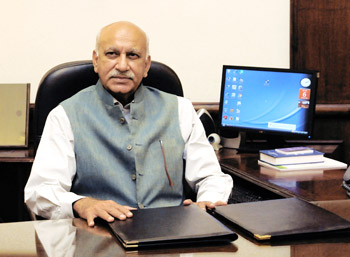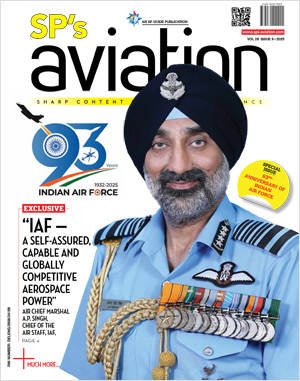INDIAN ARMED FORCES CHIEFS ON OUR RELENTLESS AND FOCUSED PUBLISHING EFFORTS

The insightful articles, inspiring narrations and analytical perspectives presented by the Editorial Team, establish an alluring connect with the reader. My compliments and best wishes to SP Guide Publications.

"Over the past 60 years, the growth of SP Guide Publications has mirrored the rising stature of Indian Navy. Its well-researched and informative magazines on Defence and Aerospace sector have served to shape an educated opinion of our military personnel, policy makers and the public alike. I wish SP's Publication team continued success, fair winds and following seas in all future endeavour!"

Since, its inception in 1964, SP Guide Publications has consistently demonstrated commitment to high-quality journalism in the aerospace and defence sectors, earning a well-deserved reputation as Asia's largest media house in this domain. I wish SP Guide Publications continued success in its pursuit of excellence.
- A leap in Indian aviation: Prime Minister Modi inaugurates Safran's Global MRO Hub in Hyderabad, Calls It a Milestone
- All about HAMMER Smart Precision Guided Weapon in India — “BEL-Safran Collaboration”
- India, Germany deepen defence ties as High Defence Committee charts ambitious plan
- True strategic autonomy will come only when our code is as indigenous as our hardware: Rajnath Singh
- EXCLUSIVE: Manish Kumar Jha speaks with Air Marshal Ashutosh Dixit, Chief of Integrated Defence Staff (CISC) at Headquarters, Integrated Defence Staff (IDS)
- Experts Speak: G20 Summit: A Sign of Global Fracture
Strengthening West Asian Ties
 |
By Lt. General P.C. Katoch (Retd) Former Director General of Information Systems, Indian Army |

The recent visit to Lebanon, Syria and Iraq from August 17 - 23 by MoS External Affairs MJ Akbar has strengthened India’s ties with these countries as that part of the world continues to remain in turmoil. The visit was aimed at: strengthen bilateral ties; gain firsthand assessment of the region, and; discuss security issues including the threat from ISIS and the 39 Indians who were taken hostage when ISIS captured the city of Mosul in 2014. As a prelude to Akbar’s visit to Iraq, MEA had issued a statement saying, “Our time-tested, warm and friendly relations with Iraq are underpinned by historical and religious linkages, strong people-to-people contacts, our energy security quest and capacity-building cooperation. The visit is expected to add further impetus to our bilateral engagement and will also provide an opportunity to meet other senior leaders of Iraq, including religious leaders, and to convey India’s abiding commitment to the emergence of a stable, peaceful, united and democratic Iraq, which is in the interest of regional and global peace and security”. Akbar’s visit to Iraq was at a time when large parts of Iraq have been captured by ISIS and conflict is raging with government forces battling to get these areas back. Iraq was at the top spot in the Global Terrorism Index of 2015. In his talks with Iraq’s Foreign Minister Ibrahim Al-Eshaiqer Al-Jafari, Akbar discusse bilateral, regional and international issues of mutual interest.
The issue of 39 Indians abducted by ISIS was also discussed. The battle to retake Mosul is presently ongoing. In Iraq, Akbar also visited the holy city of Karbala, one of foremost holy city of Shiite Muslims. This was watched with interest since Akbar is a Sunni and the Sunni-Shia divide has put the Muslim world in turmoil. Significantly, of the 1,67,221 terrorist related fatalities in period 2001-2015, 75 per cent of these have been in 25 Muslim-majority countries (Muslims killed by Muslims) albeit fatalities have also included non-Muslims, as per University of Maryland Global Terrorism Database. Akbar’s visit has given impetus to Indo-Iraq bilateral relations, however, it is ironic that even had an Indian Military Training Team in Iraq during the Saddam regime, would up the Defence Wing in our Embassy at Baghdad and never reopened it. Incidentally, the Defence Wing in the Chinese Embassy at Baghdad is headed by a Major General level officer. In Syria, Akbar called on Syrian President Bashar al-Assad and Prime Minister Emad Mohammad Deeb Khamis. He also interacted with the Grand Mufti of Syria, Ahmad Badreddin Hassoun.
President Assad, during his meeting with Akbar , sought India’s help in the reconstruction of his country’s economy while the two countries agreed to upgrade their security consultations including cases of Indian nationals being influenced by ISIS. Both acknowledged that terrorism was a global problem. Assad welcomed India’s objective position on the Syrian conflict and reportedly urged India to play the role of a growing power to stabilize West Asia rather than being defensive - an oblique reference to be pro-active on the issue. Akbar said that the age of destruction should give way to reconstruction in Syria. It may be recalled that in an interview to the media, Syrian Ambassador to India, Riad Kamel Abbas had referred to India as a friend of Syria saying, “If everybody has done what India has done, we wouldn’t have any problem in Syria. It’s a champion of the principle that there should not be any external interference in the internal affairs of a country.” He also lauded Prime Minister Narendra Modi who had made it very clear that "there’s no bad terrorism and good terrorism. There’s only terrorism." When questioned about Kashmir and the Organization of Islamic Countries (OIC) criticising India for alleged human rights violations in tackling violence in Kashmir, Mr. Abbas categorically stated that Syria being a secular state differs from the OIC, adding, “What is happening in Kashmir is an internal issue for India. Anyone who raises a weapon against the government, we call them terrorists, and the government must take action against them.” With seven million Indians in the West Asian region, India has much to gain by strengthening ties in the region. There is also need to balance ties with Sunni-majority and Shia-majority nations, where India can be a binding factor to ameliorate relations between the two blocs. The region also meets large requirements of India’s energy needs. MJ Akbar’s visit certainly has boosted India’s relationship with these West Asian countries. India also needs to expand military to military relations in its extended neighbourhood concurrent to diplomatic outreach.
Photo Credit: PIB





